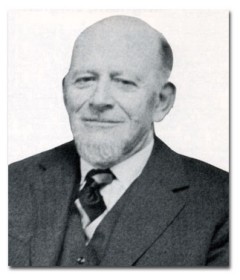Liberty Matters
Lachmann: Still a Puzzle
 When comparing the works of great thinkers, one can choose to emphasize their differences or their similarities. Clearly, Lachmann had many differences with both Mises and Hayek, but many similarities as well. Questions of influence are even more fraught with difficulties, and ultimately, we must content ourselves with not being able to achieve definitive answers.
When comparing the works of great thinkers, one can choose to emphasize their differences or their similarities. Clearly, Lachmann had many differences with both Mises and Hayek, but many similarities as well. Questions of influence are even more fraught with difficulties, and ultimately, we must content ourselves with not being able to achieve definitive answers.I have always found Lachmann's work particularly puzzling. Given how often my own interpretation of his work has changed, I would be the last person to suggest that there is anything like a correct interpretation of his work. As I dig deeper into his work, it continues to surprise me.
For example, it was only recently that I became aware of his involvement in the interwar debates in Germany on constitutional law, involving Hans Kelsen, Herman Heller, Carl Schmitt, and Rudolf Smend. This included writing about Smend, Schmitt and Heller in his dissertation and other works, and participating in Carl Schmitt's seminar in Berlin shortly before Lachmann was forced to leave Germany. This background has given me a new perspective on the "On Politics" chapter in The Legacy of Max Weber.
Similarly, it was only after Hans Eicholz persuaded me to pay more attention to Werner Sombart's book on economic methodology, Die drei Nationalökonomien, which was written while Lachmann was his student, that I was able to make sense of a puzzling introductory section in Lachmann's article (1937) "Uncertainty and Liquidity Preference."
I still think the differences that Lachmann had with Hayek have been overdrawn. Lachmann was clearly unwilling to follow Hayek into complex systems and evolutionary theory, but this was later in Hayek's career, not "from the 1940s." In correspondence, Lachmann shows great excitement for Hayek's work in the 1950s and 1960s. He was especially excited about Hayek's Constitution of Liberty, and his unfinished, New Look at Economic Theory. Lachmann also in their correspondence explained his work on the Legacy of Max Weber to Hayek.
Lachmann published two work's that dealt explicitly with Hayek's Law, Legislation and Liberty. A 1980 review of volume three in the Journal of Economic Literature, and in his 1979 essay, "The Flow of Legislation and the Permanence of the Legal Order." While perhaps coincidental, it is interesting that Lachmann's early paper on institutions, (1963) "Wirtschaftsordung und wirtschaftliche Institutionen," was published in the University of Freiburg journal, Ordo, shortly after Hayek moved there.
I will close with an excerpt from an interview that Lachmann gave on July 17, 1974 for the Institute for Humane Studies, which is available at the Hoover archives. This was Lachmann's response when asked about his impressions of and relations to Mises and Hayek:
"I know Hayek better than Mises. He was my supervisor for the Ms. Com., and I have kept in close contact with him ever since.Mises, I only met three or four times. His work has strongly influenced me, Human Action has greatly influenced me. As regards the philosophical basis of economics, I think I feel nearer to Mises than to anybody else.I owe Hayek most of my economic ideas to him and that my work as an economist has been most strongly influenced by him than anyone else. I also entirely subscribe to his political views. I do think that his Constitution of Liberty is one of the great books of our time."
Copyright and Fair Use Statement
“Liberty Matters” is the copyright of Liberty Fund, Inc. This material is put on line to further the educational goals of Liberty Fund, Inc. These essays and responses may be quoted and otherwise used under “fair use” provisions for educational and academic purposes. To reprint these essays in course booklets requires the prior permission of Liberty Fund, Inc. Please contact oll@libertyfund.org if you have any questions.